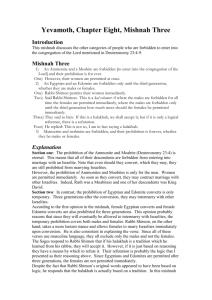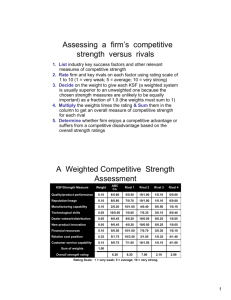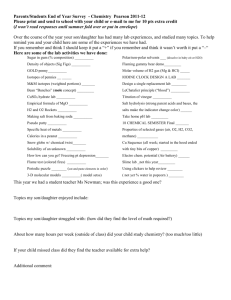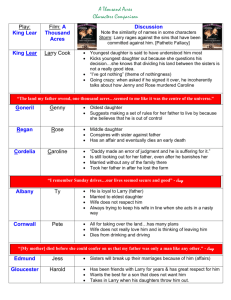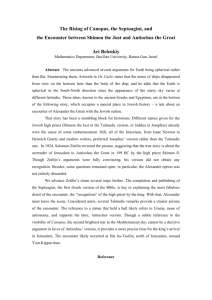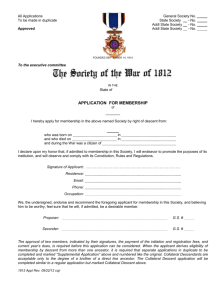Yevamoth 1-1
advertisement
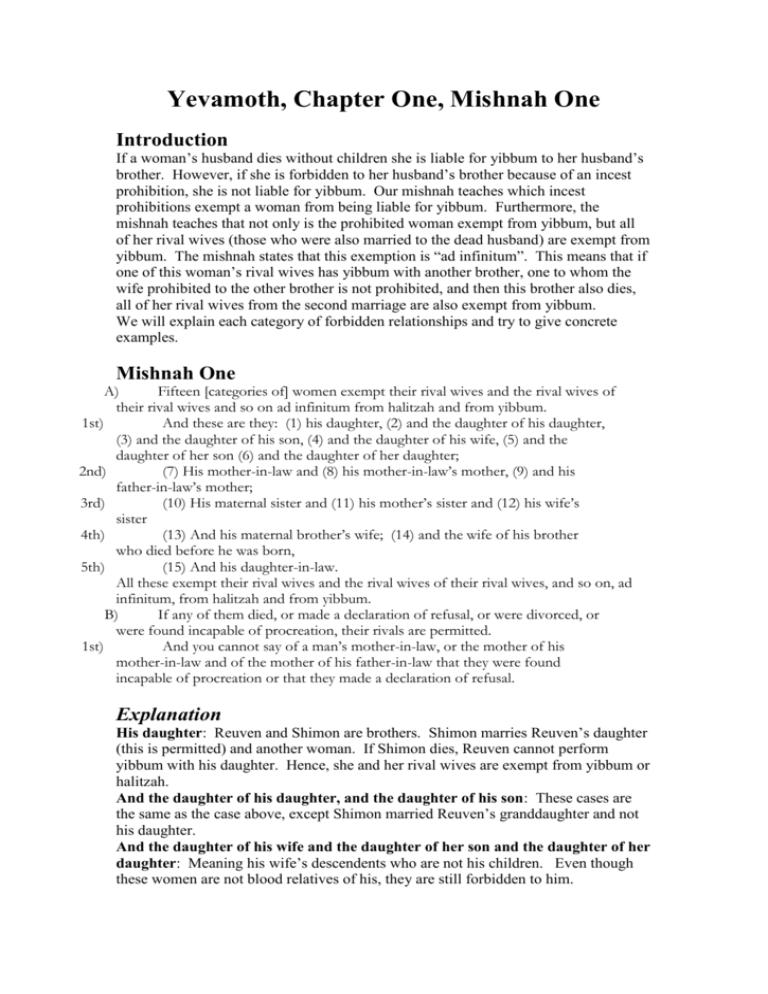
Yevamoth, Chapter One, Mishnah One Introduction If a woman’s husband dies without children she is liable for yibbum to her husband’s brother. However, if she is forbidden to her husband’s brother because of an incest prohibition, she is not liable for yibbum. Our mishnah teaches which incest prohibitions exempt a woman from being liable for yibbum. Furthermore, the mishnah teaches that not only is the prohibited woman exempt from yibbum, but all of her rival wives (those who were also married to the dead husband) are exempt from yibbum. The mishnah states that this exemption is “ad infinitum”. This means that if one of this woman’s rival wives has yibbum with another brother, one to whom the wife prohibited to the other brother is not prohibited, and then this brother also dies, all of her rival wives from the second marriage are also exempt from yibbum. We will explain each category of forbidden relationships and try to give concrete examples. Mishnah One A) Fifteen [categories of] women exempt their rival wives and the rival wives of their rival wives and so on ad infinitum from halitzah and from yibbum. 1st) And these are they: (1) his daughter, (2) and the daughter of his daughter, (3) and the daughter of his son, (4) and the daughter of his wife, (5) and the daughter of her son (6) and the daughter of her daughter; 2nd) (7) His mother-in-law and (8) his mother-in-law’s mother, (9) and his father-in-law’s mother; 3rd) (10) His maternal sister and (11) his mother’s sister and (12) his wife’s sister 4th) (13) And his maternal brother’s wife; (14) and the wife of his brother who died before he was born, 5th) (15) And his daughter-in-law. All these exempt their rival wives and the rival wives of their rival wives, and so on, ad infinitum, from halitzah and from yibbum. B) If any of them died, or made a declaration of refusal, or were divorced, or were found incapable of procreation, their rivals are permitted. 1st) And you cannot say of a man’s mother-in-law, or the mother of his mother-in-law and of the mother of his father-in-law that they were found incapable of procreation or that they made a declaration of refusal. Explanation His daughter: Reuven and Shimon are brothers. Shimon marries Reuven’s daughter (this is permitted) and another woman. If Shimon dies, Reuven cannot perform yibbum with his daughter. Hence, she and her rival wives are exempt from yibbum or halitzah. And the daughter of his daughter, and the daughter of his son: These cases are the same as the case above, except Shimon married Reuven’s granddaughter and not his daughter. And the daughter of his wife and the daughter of her son and the daughter of her daughter: Meaning his wife’s descendents who are not his children. Even though these women are not blood relatives of his, they are still forbidden to him. His mother-in-law and his mother-in-law’s mother, and his father-in-law’s mother: In this case Shimon marries Reuven’ wife’s mother, or Reuven’s wife’s maternal or paternal grandmother. Since these women are all forbidden to Reuven, when Shimon dies without children they and their rival wives are exempt from yibbum. His maternal sister: Reuven and Shimon are paternal brothers. Shimon marries Reuven’s maternal sister. This is permitted since she does not share any parent with Shimon. When Shimon dies, she cannot have yibbum with Reuven, since he is her brother. Therefore, she and her rival wives are exempt. And his mother’s sister: Again, Reuven and Shimon are paternal brothers. Shimon marries Reuven’s mother’s sister, and then dies. Since she, as Reuven’s aunt, is prohibited to him, she and all of her rival wives are exempt from yibbum. And his wife’s sister: Reuven and Shimon marry two sisters. When Shimon dies, Reuven cannot marry his wife’s sister. This will be the typical case mentioned in many subsequent mishnayoth. And his maternal brother’s wife: Reuven and Shimon are maternal brothers and Reuven and Levi are paternal brothers. When Shimon dies Levi marries his widow (not through yibbum). She is permitted to him since Levi and Shimon are not brothers. When Levi dies, Reuven should have to do yibbum with his wife. However, she was originally Shimon’s wife and as Shimon’s wife she would not have had to do yibbum with Reuven, since yibbum is done only with paternal brothers. Since she was originally married to a man who made her forbidden to Reuven (the general prohibition of marrying your brother’s wife is true for both paternal and maternal brothers), she cannot have yibbum with him even after subsequent marriages. And the wife of his brother who died before he was born: Reuven marries a woman and dies before Shimon, his brother, is born. This woman has yibbum with Levi, a different brother. When Shimon grows up, Levi dies without children. Since Shimon was not alive when this woman married Reuven, he cannot have yibbum with her (this is learned exegetically from a verse). She and her rival wives are therefore exempt. And his daughter-in-law: Reuven and Shimon are brothers. When Reuven’s son dies, Shimon marries the widow. When Shimon dies, this woman, who used to be Reuven’s daughter-in-law, becomes liable to yibbum. Since she is forbidden to him, she and all of her rival wives are exempt. If any of them died, or made a declaration of refusal, or were divorced, or were found incapable of procreation, their rivals are permitted: If any of these women who were forbidden to the yavam, and therefore were themselves exempt and caused their rival wives to be exempt, were not married at the time of the brother’s death, the rival wives are permitted to have yibbum. The mishnah lists several ways in which the marriage could have been terminated. The two simplest are death and divorce. The “declaration of refusal” (me’un), refers to a case where an orphan girl’s marriage was arranged by her mother or brother. This type of marriage is different from the usual marriage, which is arranged by the father. Marriage arranged by a mother or brother is only of rabbinic status; therefore the girl has a right to refuse, and thereby annul the marriage upon her reaching majority age. “Incapable of procreation” (aylonit) refers to a woman who never reaches puberty. She is clearly female, but never looks like an adult female, i.e. she has no breasts or puberty hair. [An aylonit is not merely a woman who has not had children. She must also not look like an adult female.] By definition, this type of woman cannot procreate. Since she cannot procreate, she is not liable for yibbum. After all the purpose of yibbum is to have children. Since she is not subject to the laws of yibbum, the fact that she is prohibited to the yavam does not exempt her rival wives. In all of these cases, the brother dies after his marriage to the wife forbidden to his brother has already been terminated. Therefore, the forbidden (former) wives do not exempt their rival wives from yibbum. And you cannot say of a man’s mother-in-law, or the mother of his mother-inlaw and of the mother of his father-in-law that they were found incapable of procreation or that they made a declaration of refusal: The mishnah merely points out that three of the above categories cannot fit two of the possibilities for terminating marriage. A woman who has already had children (by definition a mother-in-law has had children) cannot be considered “incapable of procreation”. Nor could she “refuse” a marriage, for refusal of marriage takes place upon reaching majority, and not afterwards.

